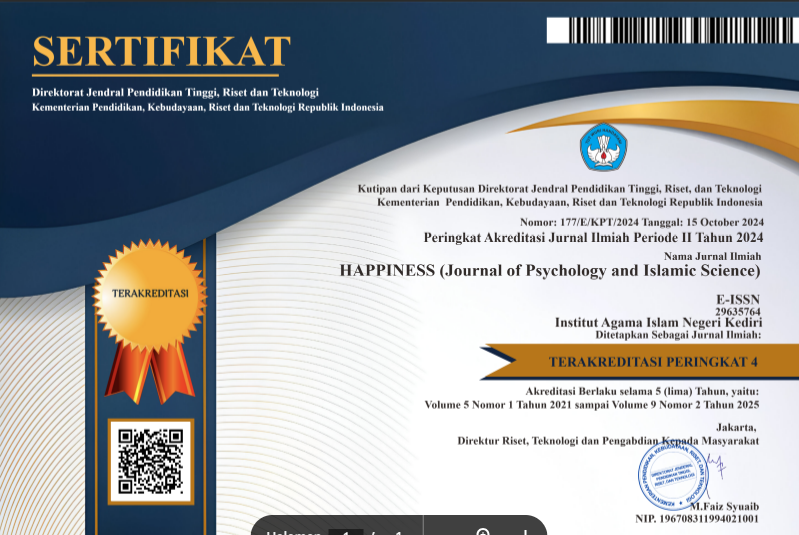Penerapan Social Skills Training (SST) untuk Meningkatkan Social Skill Performance pada Anak
DOI:
https://doi.org/10.30762/happiness.v7i1.1136Keywords:
Social skills training, Social skills performance, ChildrenAbstract
As social beings, everyone is required to be able to adjust in the social environment. But in fact, there are individuals who have difficulty adjusting because they have social skills deficits. Deficits of social skills can be measured using the social skills rating system (SSRS) which refers to the theory of Gresham and Elliott which explains that there are three aspects that can be used as a reference for measuring social skills, namely the ability to cooperate, assertive behavior, and the ability to control oneself. Based on these conditions, researchers conducted experimental research to determine the effectiveness of Social Skills Training (SST) as an effort to overcome social skill deficits owned by individuals. This study involved a 7-year-old boy who was studying at an elementary school. Based on the results of the SSRS measurement, the child has a deficit in social skills. The method used in this research is a single case experimental design (DEKT), with pre-test and post-test applied to the subject. The result is Social Skills. The training was able to improve the subject's social skills. The increase that occurred included all three aspects of social skills, namely the subject had shown the ability to work together with his peers, was able to convey what he wanted, thought, and felt, and was able to control himself when he was in an unpleasant situation. Overall, the subject's social skills after the SST intervention were in the high category.
Downloads
References
Azzahra, F. (2020). Meningkatkan keterampilan sosial dengan social skill training pada anak autis. Procedia: Studi Kasus Dan Intervensi Psikologi, 4(1), 29–39. https://doi.org/DOI: 10.22219/procedia.v4i1.11964
Cartledge, G., & Milburn, J. F. (1995). Teaching social skills to children and youth: Innovative approaches. Allyn & Bacon.
Deliana, S. M. (2009). Problematika perkembangan anak. CV. Widya Karya.
Dewi, A. R. T. (2018). Pengaruh Keterlibatan Orangtua Terhadap Perilaku Sosial Emosinal Anak. Jurnal Golden Age, 2(02), 66–74.
Elliott, S. N., & Busse, R. (1991). Social skills assessment and intervention with children and adolescents: Guidelines for assessment and training procedures. School Psychology International, 12(1–2), 63–83.
Elliott, S. N., Malecki, C. K., & Demaray, M. K. (2001). New directions in social skills assessment and intervention for elementary and middle school students. Exceptionality, 9(1–2), 19–32.
Elliott, S. N., Sheridan, S. M., & Gresham, F. M. (1989). Assessing and treating social skills deficits: A case study for the scientist-practitioner. Journal of School Psychology, 27(2), 197–222.
Hurlock, E. B. (1998). Perkembangan anak jilid 1. (Tjandrasa, Meitasari: Penerjemah). Erlangga.
Maharani, L., & Damayanti, R. (2017). Social skill training: Latihan keterampilan sosial pada anak usia dini yang mengalami isolasi sosial pasca bencana. Proceeding IAIN Batusangkar, 1(1), 86–92.
Miltenberger, R. G. (2004). Principles and procedures. J. Snowman, & R. Biehler (2002). Psychology Applied to Teaching. Boston, MA: Houghton Mifflin.
Mulyani, R. R. (2013). Meningkatkan kemampuan interaksi sosial pada anak dengan Social Skill Training. Procedia: Studi Kasus Dan Intervensi Psikologi, 1(1). https://doi.org/10.22219/procedia.v1i1.1368
Purswell, K. E., & Ray, D. C. (2014). Research with small samples: Considerations for single case and randomized small group experimental designs. Counseling Outcome Research and Evaluation, 5(2), 116–126. https://doi.org/10.1177/21501378145524
Puspitasari, D. N. (2014). Pelatihan keterampilan sosial untuk menurunkan perilaku agresif anak. Jurnal Psikologi Tabularasa, 9(1). https://doi.org/10.26905/jpt.v9i1.236
Qamaria, R. S., & Astuti, F. (2023). Meningkatkan Motivasi Belajar Pada Remaja Melalui Konseling Behavioral Dengan Teknik Self Management. Proyeksi: Jurnal Psikologi, 18(1), 1–22.
Rai, N. G. M. (2015). Social Skill Training (SST) sebagai Intervensi Pada Anak dengan Gangguan Sikap Menentang. Jurnal Sosial Humaniora (JSH), 8(1), 55–68. http://dx.doi.org/10.12962/j24433527.v8i1.1242
Ramdhani, N. (2007). Pelatihan keterampilan sosial untuk terapi kesulitan bergaul. Jurnal Psikologi, 3.
Ratnawati, E. (2016). Kajian Psikologis tentang Pendekatan Teori Reinforcement talam Proses Pembelajaran. Edueksos: Jurnal Pendidikan Sosial Dan Ekonomi, 4(1).
Rusli, R. K., & Kholik, M. (2013). Teori belajar dalam psikologi pendidikan. Jurnal Sosial Humaniora, 4(2).
Scott, E. (2013). Generalization of social skills training on disruptive classroom behavior. East Carolina University.
Supraktiknya, A. (2022). Desain eksperimental kasus tunggal. Diakses.
Susilana, R., & Herlina, H. (2020). Melatih Keterampilan Sosial pada Anak dengan Autisme. Universitas Pendidikan Indonesia. https://psikologi.upi.edu/wp-content/uploads/2020/09/PIM-Materi-4-Konsep-Intervensi.pdf
Tedjawidjaja, D., & Kuntoro, I. A. (2020). Penerapan Social Skill Training Pada Anak Usia Sekolah Dengan Kesulitan Menjalin Pertemanan. Journal of Psychological Science and Profession, 4(1), 36–46. https://doi.org/10.24198/jpsp.v4i1.23955
Widiasmara, N. (2016). Studi pendahuluan: Keterampilan sosial siswa Sekolah Dasar Inklusi Di Yogyakarta.
Downloads
Published
How to Cite
Issue
Section
License
Copyright (c) 2023 Rezki Suci Qamaria

This work is licensed under a Creative Commons Attribution-ShareAlike 4.0 International License.





















